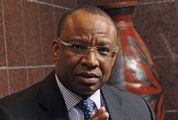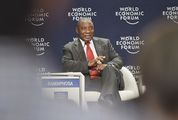Source:

BUSINESS DAY TV: Gaming company shrugs off almost nonexistent sales growth
by Transcript service,
2016-02-24 18:18:20.0
GRAEME Stephens is the CEO of Sun International.
BUSINESS DAY TV: Sun International has been able to partly shrug off almost nonexistent sales growth at home, thanks to its Chilean operations, the effect of the strong peso and also the decision to convert $141m worth of debt into rand before December’s Nenegate disaster. It’s paid out a dividend this time but with capex costs ramping up and the economy stuttering, future dividends aren’t a sure bet. Joining me now on the line is CEO, Graeme Stephens.
Graeme ... firstly how much are you spending, where are you spending it and for how long are you spending it because capex is obviously going to impact on dividends if we take into effect weak economies?
GRAEME STEPHENS: Our big spend is on a project on the east side of Tshwane (Pretoria), in Menlyn. We’ve got about R4bn that we’ll spend over the next 18 months or so there. So that’s the big spend and we’ve obviously factored in that plus dividends in a normal world. So we’ve continued to pay the dividend now but if the economy worsens, much further, we’ve reserved our rights to review that while we’re in a period of high spend.
BDTV: Yes, what are the indications like at the moment especially from South African operations, because growth was 0.6% as far as revenue was concerned for the first half, has it gotten any better?
GS: It actually has. You don’t see our quarterly results, we had a much better second quarter within that half and so a bit more growth in the last few months and trends are probably more positive than negative. I’m not sure if we put that down to the economy. We’ve also been doing quite a lot to bed down changes we’ve been making ourselves over the last year or two. So I’m not sure which is at play but the last few months have been a little better, so some cause for optimism.
BDTV: Okay, well that’s, I suppose, somewhat encouraging. What about the decision to in-source food and beverage operations? Just remind us why you did that because it’s obviously had a big impact on the top line but clearly because of the cost involved, it’s yet to have a positive impact on your profits?
GS: Yes ... the primary reason which we stated at the time was to improve guest experience. There were essentially three main reasons: guest experience first and foremost. We had a situation where guests were coming into our properties and wherever they were eating, it wasn’t us preparing and serving the food, or preparing the price list so we had high prices, maybe inferior quality of service and food. We couldn’t control the opening and closing times of restaurants, so we stepped in to take control of a very core component of our offering. When people think about brand it might be gaming but it’s also food and beverage and hotels, and we weren’t in control of the food and beverage. So we’re hoping to improve guest experience, we’re hoping to improve the lot of the employees that work in those businesses, and our full-time Sun International employees. So happy employees again hopefully means a better guest experience, and then last but definitely not least, we hope to make some money out of it. It is a lower margin business generically than our core gaming business so it’s never going to make the same sort of margins. Where we are, we’ve got through the major hump of taking on businesses and thousands of staff over the last year. The next year is really (about) ... trying to fine tune it and get efficient and start to make reasonable food and beverage margins which will always be lower than gaming.
BDTV: There were (a) few, I suppose, weird things that one had to contend with in your results, please can you talk us through the Menlyn Maine note, because it’s worth R747m, it relates to, I suppose, the failure to come to a deal with Peermont as a result of the Competition Commission, is this money that you have to stump up? Please, in a nutshell, could you explain it?
GS: Quite a big nutshell. We had a situation where Peermont were objecting to us relocating to build this big casino outside Pretoria and that objection could potentially have kept us in court for a couple of years, two to three years and in fact may have been successful. So at the inception of our deal with Peermont we agreed a number of between R700m (and) R900m for them to lift that objection such that Menlyn could proceed, and that became plan B. Plan A was to buy the whole of Peermont, which was a transaction we had pursued with some vigour over the last year but it hit a bit of a dead end with the inability to get it through the Competition Commission. So we really are defaulting to plan B and in fact we’ve settled it at R675m and we will settle at the end of April. And Menlyn has progressed, so the minute they lifted their objection, which was some time ago now, they can’t reinstate it. So Menlyn is full steam ahead and will open next year but to compensate them for lifting that objection we now simply make a payment because the overall deal is not going to go ahead.
BDTV: Yes, okay, but now having taken this decision and having paid this money or taken the decision to pay this money to Peermont, you’ve got the Gauteng MEC wanting to introduce a new tax structure for gaming groups. And you say that it’s going to have a significant increase in taxes on gaming companies in the province.... You’ve gathered together with the Casino Association (of SA), are you confident that you’ll be able to fight it?
GS: We will fight it, there’s a trend in government to place increased taxes on casinos so whether we win totally or whether we concede on something in between we’ll find out. But regardless of those taxes, even in their proposed form, Menlyn is a project that still makes sense. Of that we’re absolutely certain. It can absorb the settlement objections, it can absorb the extra taxes. Obviously the returns will be reduced by incremental tax but the project overall certainly still makes sense.
BDTV: And then just lastly, I ... haven’t mentioned Chile but things do seem to be going better there and certainly they contributed quite a lot to the growth in revenue that you experienced, but what about this International VIP business you’ve set up? What is the significance of this for the greater Sun International Group?
GS: It’s a foray into what a lot of the international casino companies already have, which is to attract gamblers that might be tourists, if you like, to SA. So most normal tourists don’t gamble but if you find gamblers that are part-time tourists that makes sense.
BDTV: It’s a win.
GS: So we’ve started the programme to bring them out to Sun City first and we might expand it to our other units. It’s been very well received, we’ve been quite cautious. These guys gamble big and you can win and lose in a casino, it’s not all one-way traffic in our favour. So we’ve gone into it fairly cautiously, it’s been well received and it’s a new source of gaming revenue in an economy where the local gaming revenues as you can see are fairly flat.
GRAEME Stephens is the CEO of Sun International.
BUSINESS DAY TV: Sun International has been able to partly shrug off almost nonexistent sales growth at home, thanks to its Chilean operations, the effect of the strong peso and also the decision to convert $141m worth of debt into rand before December’s Nenegate disaster. It’s paid out a dividend this time but with capex costs ramping up and the economy stuttering, future dividends aren’t a sure bet. Joining me now on the line is CEO, Graeme Stephens.
Graeme ... firstly how much are you spending, where are you spending it and for how long are you spending it because capex is obviously going to impact on dividends if we take into effect weak economies?
GRAEME STEPHENS: Our big spend is on a project on the east side of Tshwane (Pretoria), in Menlyn. We’ve got about R4bn that we’ll spend over the next 18 months or so there. So that’s the big spend and we’ve obviously factored in that plus dividends in a normal world. So we’ve continued to pay the dividend now but if the economy worsens, much further, we’ve reserved our rights to review that while we’re in a period of high spend.
BDTV: Yes, what are the indications like at the moment especially from South African operations, because growth was 0.6% as far as revenue was concerned for the first half, has it gotten any better?
GS: It actually has. You don’t see our quarterly results, we had a much better second quarter within that half and so a bit more growth in the last few months and trends are probably more positive than negative. I’m not sure if we put that down to the economy. We’ve also been doing quite a lot to bed down changes we’ve been making ourselves over the last year or two. So I’m not sure which is at play but the last few months have been a little better, so some cause for optimism.
BDTV: Okay, well that’s, I suppose, somewhat encouraging. What about the decision to in-source food and beverage operations? Just remind us why you did that because it’s obviously had a big impact on the top line but clearly because of the cost involved, it’s yet to have a positive impact on your profits?
GS: Yes ... the primary reason which we stated at the time was to improve guest experience. There were essentially three main reasons: guest experience first and foremost. We had a situation where guests were coming into our properties and wherever they were eating, it wasn’t us preparing and serving the food, or preparing the price list so we had high prices, maybe inferior quality of service and food. We couldn’t control the opening and closing times of restaurants, so we stepped in to take control of a very core component of our offering. When people think about brand it might be gaming but it’s also food and beverage and hotels, and we weren’t in control of the food and beverage. So we’re hoping to improve guest experience, we’re hoping to improve the lot of the employees that work in those businesses, and our full-time Sun International employees. So happy employees again hopefully means a better guest experience, and then last but definitely not least, we hope to make some money out of it. It is a lower margin business generically than our core gaming business so it’s never going to make the same sort of margins. Where we are, we’ve got through the major hump of taking on businesses and thousands of staff over the last year. The next year is really (about) ... trying to fine tune it and get efficient and start to make reasonable food and beverage margins which will always be lower than gaming.
BDTV: There were (a) few, I suppose, weird things that one had to contend with in your results, please can you talk us through the Menlyn Maine note, because it’s worth R747m, it relates to, I suppose, the failure to come to a deal with Peermont as a result of the Competition Commission, is this money that you have to stump up? Please, in a nutshell, could you explain it?
GS: Quite a big nutshell. We had a situation where Peermont were objecting to us relocating to build this big casino outside Pretoria and that objection could potentially have kept us in court for a couple of years, two to three years and in fact may have been successful. So at the inception of our deal with Peermont we agreed a number of between R700m (and) R900m for them to lift that objection such that Menlyn could proceed, and that became plan B. Plan A was to buy the whole of Peermont, which was a transaction we had pursued with some vigour over the last year but it hit a bit of a dead end with the inability to get it through the Competition Commission. So we really are defaulting to plan B and in fact we’ve settled it at R675m and we will settle at the end of April. And Menlyn has progressed, so the minute they lifted their objection, which was some time ago now, they can’t reinstate it. So Menlyn is full steam ahead and will open next year but to compensate them for lifting that objection we now simply make a payment because the overall deal is not going to go ahead.
BDTV: Yes, okay, but now having taken this decision and having paid this money or taken the decision to pay this money to Peermont, you’ve got the Gauteng MEC wanting to introduce a new tax structure for gaming groups. And you say that it’s going to have a significant increase in taxes on gaming companies in the province.... You’ve gathered together with the Casino Association (of SA), are you confident that you’ll be able to fight it?
GS: We will fight it, there’s a trend in government to place increased taxes on casinos so whether we win totally or whether we concede on something in between we’ll find out. But regardless of those taxes, even in their proposed form, Menlyn is a project that still makes sense. Of that we’re absolutely certain. It can absorb the settlement objections, it can absorb the extra taxes. Obviously the returns will be reduced by incremental tax but the project overall certainly still makes sense.
BDTV: And then just lastly, I ... haven’t mentioned Chile but things do seem to be going better there and certainly they contributed quite a lot to the growth in revenue that you experienced, but what about this International VIP business you’ve set up? What is the significance of this for the greater Sun International Group?
GS: It’s a foray into what a lot of the international casino companies already have, which is to attract gamblers that might be tourists, if you like, to SA. So most normal tourists don’t gamble but if you find gamblers that are part-time tourists that makes sense.
BDTV: It’s a win.
GS: So we’ve started the programme to bring them out to Sun City first and we might expand it to our other units. It’s been very well received, we’ve been quite cautious. These guys gamble big and you can win and lose in a casino, it’s not all one-way traffic in our favour. So we’ve gone into it fairly cautiously, it’s been well received and it’s a new source of gaming revenue in an economy where the local gaming revenues as you can see are fairly flat.




















Login OR Join up TO COMMENT